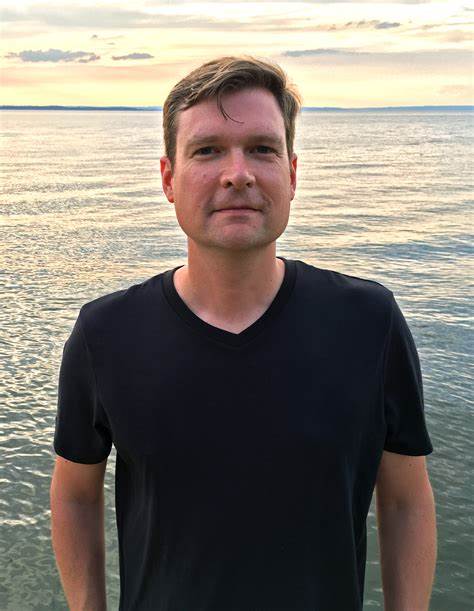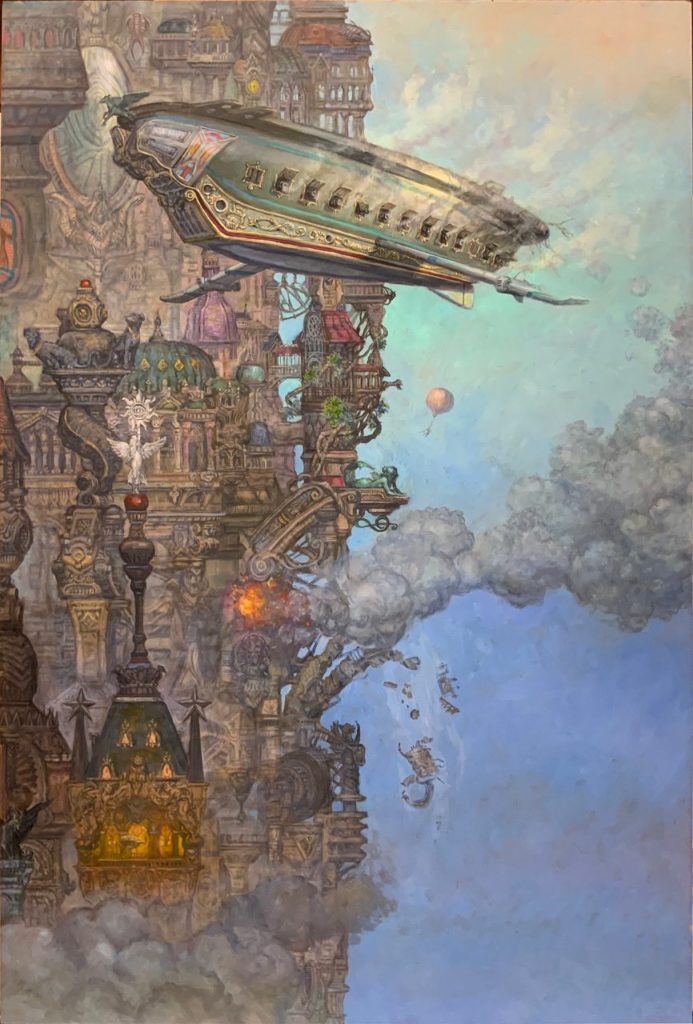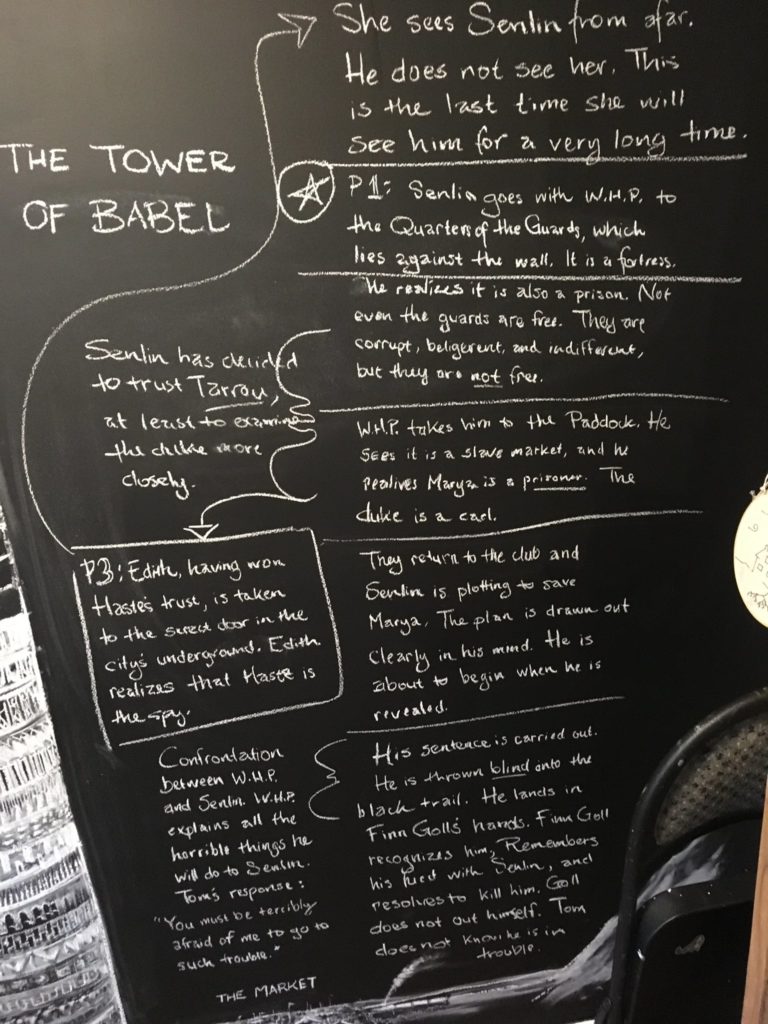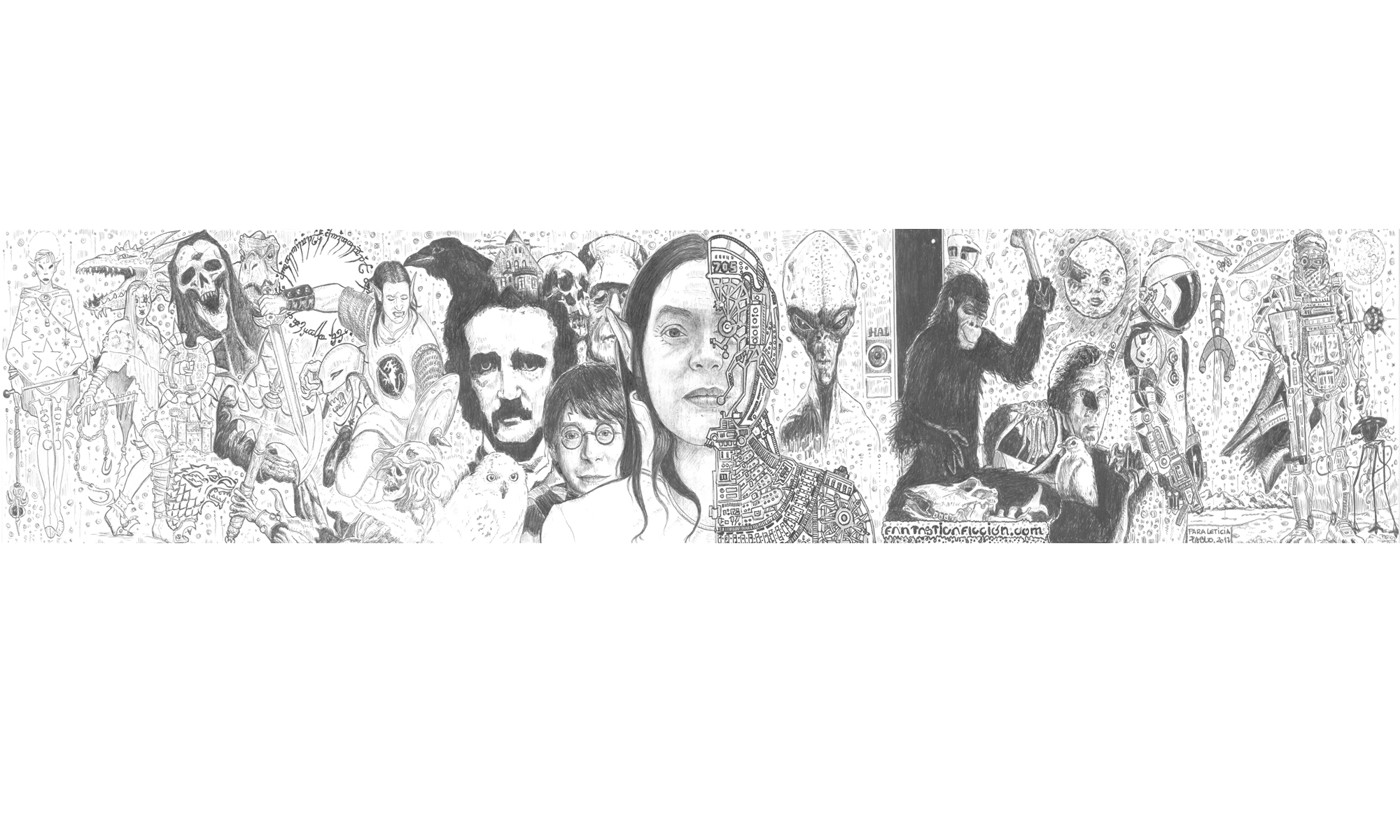Me hace especial ilusión poder ofreceros esta entrevista con Josiah Bancroft, creador de la estupenda y poco conocida por estos lares serie de La Torre de Babel, que ha tenido la deferencias de contestar a nuestras preguntas a pesar de estar inmerso en la finalización de la obra. Al final de la página podéis leer la entrevista en el inglés original.
Los dos primeros libros de tu serie de Babel fueron autopublicados pero el resto de los libros los ha publicado Orbit. ¿Nos puedes comentar cómo fue este proceso? ¿Cuál de las vías de publicación prefieres?
Cuando autopubliqué Senlin Ascends allá por el 2013, el escenario era muy diferente al que existe hoy en día. Había muchos prejuicios en contra de los autopublicados entre los lectores, los escritores y los miembros de la industria. Para ellos, autopublicarse es un tema de vanidad. Dejando de lado la pregunta sobre la legitimidad de la autopublicación,había y sigue habiendo retos. Es un proceso mucho más exigente, ya que debes pagar o hacer tú mismo de editor, corrector, diseñador, portadista, experto en marketing y publicista. Conseguir distinguirte entre el resto del mercado puede llevar años. La autopublicación es un maratón sin línea de llegada. Escribir el libro es lo más fácil del proceso.

Pero también tiene sus considerables ventajas. Lo primero y lo más importante es que tienes completo control sobre el producto. No tienes que llegar a acuerdos con los gustos de otras personas, con sus expectativas o con sus fechas. La publicación tradicional no se suele llevar bien con las novedades, porque ante todo quieren evitar riesgos. Pero si te autopublicas, puedes ir probando. Y esa experiencia es maravillosa y te hace sentir poderoso.
Mi introducción al mundo de la publicación tradicional llegó en el momento oportuno. La primera tirada de la edición de Senlin Ascends y Arm of the Sphinx de Orbit vieron la luz en la primavera de 2018, coincidiendo con el momento en que mi mujer y yo dimos la bienvenida a un mundo que no estaba preparado para ella a la fuerza de la naturaleza conocida como Maddie. Si hubiera intentado seguir como autopublicado mientras criaba a mi hija, no hubiera publicado nada, hubiera promocionado más bien poco y escrito aún menos. Orbit llevó mis libros a donde yo no era capaz de llevarlos y eso es algo que agradeceré siempre.
Mis editores en Orbit, Bradley Englert (EE.UU.) y Emily Byron (Reino Unido), también jugaron un papel muy importante en la mejor de The Hod King para su publicación. Disponer de unos editores tan capaces es una de las mejores características de la publicación tradicional. Otro beneficio de formar parte de la industria es que me representan profesionales. Mi agencia es responsable de que mis libros lleguen más lejos con bastantes traducciones e incluso que lo lean personas relacionadas con la industria del entretenimiento. Mis lectores se han multiplicado y eso es en gran medida gracias a mi editorial.
Ambas formas de publicación tienen sus beneficios. Aunque disfruto de las ventajas de la publicación tradicional, estoy contento cuando veo que los autopublicados van ganando influencia, atención y cuota de mercado.
¿Nos podrías decir si alguna editorial española se ha puesto en contacto contigo para traducir tus libros? ¿Cuál sería tu gancho para vender la serie de Babel en España?
El mundo editorial es muy curioso. Creo que muchos lectores se sorprenderían si escucharan lo poco que tienen que ver los autores con la difusión de su obra, especialmente en el mercado internacional. Estoy totalmente apartado del proceso de venta de derechos de traducción. Me traen las oportunidades que les parecen buenas y yo las firmo.
De momento, no sé nada sobre ninguna editorial española, aunque sí que conozco el interés de los lectores españoles. Me encantaría ver la serie traducida y quizá la llegada del último tomo convenza a alguna editorial para intentar comprarla.
Dejo las ventas a los profesionales. Creo que no podría venderle ni un bebé foca a un oso polar.
¿El siguiente libro de la serie será el último? ¿Qué tienes pensado escribir después?
El último libro de la serie, The Fall of Babel, concluye las historias principales que desarrollé en los tres primeros libros. Dicho esto, puede que haya nuevas publicaciones en el Babelverso. Si estos libros llegarán a existir dependerá totalmente de la existencia de una trinidad perfecta de intereses entre la editorial, los lectores y yo.
Me ha llevado una década escribir los libros de Babel. Sea lo que sea lo que empiece a continuación, será más modesto. Tengo algunas ideas para novelas cortas y relatos, pero mi principal prioridad en los siguientes meses será recargar pilas (leyendo libros) y revisar The Fall of Babel. Veremos qué nos depara el futuro después.
Ya hemos podido ver la maravillosa portada de Tom Kidd para la edición de Subterranean Press de The Hod King. ¿Se ha puesto el artista en contacto contigo durante el desarrollo de su trabajo o trabaja de forma autónoma?
Tom Kidd es un talento fantástico y una persona muy cordial y genuina. Es un privilegio trabajar con él. La vision que tiene Tom de la torre es exquisita y totalmente producto de su propia interpretación de los libros. Nunca corregiría a un artista sobre su visión de mi mundo. Creo que mientras que mis palabras pueden servir como comienzo para la inspiración, la propia visión del artista prevalece para dar integridad y autenticidad a su trabajo. Quizá vea las cosas de forma distinta en mi imaginación, pero eso es irrelevante para la visión de otra persona.

Tampoco es que los escritores tengamos mucho poder sobre esta materia, pero creo que me sentiría más o menos igual sobre una hipotética adaptación de los libros a la pequeña o la gran pantalla. Los libros de Babel son para mí una versión ya definida de las cosas que nunca podré mejorar, pero que sigue estando abierta para la interpretación y reinvención de otra persona.
¿Qué nos puedes decir sobre las influencias que dieron forma al mundo de Babel? Creo que Ciudades invisibles de Italo Calvino puede ser una de ellas, pero seguro que hay más.
Antes de sentarme a escribir Senlin Ascends, había pasado diez años estudiando literatura y escribiendo poesía, influido sobre todo por obras alejadas del fantástico. Autores como Italo Calvino, Albert Camus, Mary Shelley, Thomas Hardy, Jorge Luis Borges, Thomas Mann, Franz Kafka, Virginia Woolf, Ralph Ellison, Joyce Carol Oates, Vladimir Nabokov, Salman Rushdie, Elizabeth Bishop, y Gabriel García Márquez han contribuido en la creación.
Algunas veces imagino la torre de Babel como una especie de parque temático. ¿Crees que los planos de la torre podrían dar lugar un parque real?
¡Por supuesto! En realidad, la serie es una elaborada promoción para atraer inversores al proyecto de construcción de un parque temático: The Enchanted Ringdoms of Babel©. Naturalmente, los visitantes deberían firmar documentos legales que eximirían a Enchanted Ringdoms© y sus empresas subsidiarias de cualquier responsabilidad legal o financiera por trauma psicológicos, adicciones, captividad, esclavitud, pérdida o daño en la propiedad o en las personas y decapitaciones accidentales o intencionales.
Las principales atracciones serían The Spidereater’s Tunnel of Love, The Bottomless Library Drop Tower, The Parlor Laser Tag, y por supuesto los popularísimos Beer-Me-Go-Rounds. Los primeros inversores recibirían un tanto por cierto de las ventas de las licencias de los peluches Chimneycats© y Bullsnails©.
¿Qué nos puedes contra sobre tu nueva asistente de marketing, Maddie? ¿Cuántas tomas fueron necesarias para grabar el trailer del libro 4, The Fall of Babel? ¿Hay fecha de publicación?
A Maddie le ofendería que alguien le llamara asistente. Ella es la jefa y el talento. Con una sola toma hubiera bastado y sobrado porque siempre lo hace todo perfecto, pero condescendió en hacer 26 porque se sentía generosa y los entremeses que proveyó el catering le agradaron. Desde entonces se ha retirado de la actuación para concentrarse en su verdadera pasión: el salto base y la terapia de gritos.
The Fall of Babel no tiene todavía fecha de publicación, pero el último borrador ya está en manos de los editores, así que seguimos con el plan de lanzamiento en 2021.
He visto la trama de The Hod King en la pared de tu oficina (me parece una gran idea tenerla en una pizarra) y me hizo pensar: ¿tenías desde el principio pensada la estructura de cada planta de la torre o has ido dejándote llevar por la inspiración del momento?
¡Me lo paso muy bien con mi pared de pizarra! Recomiendo encarecidamente esta práctica a los escritores, especialmente a lo que se encuentren atascados. Garabatear en la pared de mi oficina con tiza me hacía sentir hombre de las cavernas y loco al mismo tiempo.

Conocía la trama y las funciones esenciales de la torre desde el principio. (Espero que esto sea evidente para los lectores cuando acaben la saga). Las estructuras específicas y las culturas de cada “ringdom”, sin embargo, eran aspectos de la historia que fui descubriendo por el camino. Esto fue a caso hecho. ¡Quería que la torre guardara secretos incluso para mí! E incluso con el ultimo libro ya escrito, gran parte de la torre permanece ignota. Creo que podría pasarme el resto de la vida trabajando en los 64 “ringdoms” y solo tendríamos un esquema de la torre.
Los libros de Babel comenzaron como la historia de Senlin, pero se ha convertido en una narración multipersonaje. ¿Quién es tu favorito entre ellos?
Mi personaje favorito va cambiando. Como hace poco que he terminado el final de la serie, tenía que escribir las escenas finales de unos personajes con los que he trabajado durante años. La experiencia ha sido agridulce. Algunos personajes han crecido mucho, pero al final, creo que sus partes esenciales todavía se pueden reconocer, inalteradas. Los quiero a todos.
Dicho esto, el que más me divierto escribiendo es Byron. Cuando lo creé para Arm of the Sphinx, iba a ser un personaje terciario, alguien que daría el contrapunto necesario para después desaparecer. Pero cuando empecé los borradores de The Hod King, Byron seguía saliendo en mis notas. Es insistente y charlatan con un gran corazón. Es el tipo de personaje que no ocupa espacio simplemente, en el mejor sentido de la frase, él monta la escena.
Creo que las versiones en audiolibro de tus libros son brillantes. ¿Qué piensas de los audiolibros? ¿Los usas?
Estoy encantado con la interpretación de John Banks de los libros de Babel, soy muy afortunado porque alguien de ese calibre haya participado en el proyecto. ¡Me alegra que estés de acuerdo!
Me encantaban los audiolibros cuando era pequeño. Desgasté mis cintas con The Hobbit y The Lord of the Rings. Mi audiolibro favorito de aquella época es The Screwtape Letters de C.S. Lewis, por John Cleese. Lo escuchaba para dormirme, así que sin duda tiene la culpa de algunas pesadillas espléndidas.
Dejé de escuchar audiolibros a partir de los 20 años y no volví al medio hasta varios años después, cuando tenía que viajar durante tres horas para trabajar. Me convertí de nuevo en un lector asiduo de audolibros y esta experiencia renovó mi aprecio por esta forma de arte. Un gran narrador puede mejorar un libro mediocre y un lector inepto puede arruinar un clásico. Uno de los audiolibros más memorables de esa época fue Peter Weller narrando Sttepenwolf de Herman Hesse.
De nuevo muchas gracias a Josiah por su colaboración, y ahora dejaremos de molestarle para que se pueda centrar en lo que nos interesa… ¡que acabe el libro!
The first two book of your Babel Series was self-published but the rest of the series is being published by Orbit. Can you tell us how was this process? Which way of publishing do you prefer?
When I first tested the waters by self-publishing Senlin Ascends in 2013, it was a very different pool than it is today. There was a ton of bias against self-publishing among many readers, writers, and industry insiders. To them, self-publishing seemed like vanity publishing in a bigger wig. Putting the irksome question of legitimacy aside, there were (and still are) practical challenges to self-publishing. It’s a much more demanding process, one that requires writers to play (or pay) the parts of editor, copy editor, layout designer, cover artist, marketer, and publicist. Distinguishing yourself from a crowded market requires years of effort. Self-publishing is a marathon without a finish line. Writing the book was the easy part.
But the advantages of self-publishing are considerable. First and foremost: you have complete control of your vision. You don’t have to compromise to meet other people’s tastes, expectations, or deadlines. Traditional publishers are generally skittish about novelty. They are risk adverse. But as a self-publisher, you can take a chance on yourself. And that’s a wonderful, empowering thing.
My introduction to the traditional publishing world came at an opportune time. The first print run of Orbit’s editions of Senlin Ascends and Arm of the Sphinx were published in the spring of 2018, which coincidentally was when my wife and I welcomed to this unready world the force of nature known as “Maddie.” If I had tried to function as a self-publisher while also operating as a stay-at-home dad to an infant, I would have published nothing, promoted little, and written less. Orbit carried my books when I could not, and that’s something that I will always be grateful for.
My editors at Orbit, Bradley Englert (US) and Emily Byron (UK), played a considerable role in polishing up The Hod King for publication. Having access to such capable editors is one of the perks of traditional publishing. Another benefit of being a part of the industry is professional representation. My agency has been responsible for expanding the reach of my books to include numerous translations as well as people in the entertainment industry. My readership has ballooned, and that’s largely thanks to my publisher.
Both self-publishing and traditional publishing have their benefits. Even as I enjoy the advantages of traditional publication, I’m very glad to see self-publishing continue to gain clout, attention, and a share of the market.
If you are able to, would you mind letting us know if you’ve ever been contacted by a Spanish publishing company to publish your books in translation? What would be your sales pitch for your Babel Series in Spain?
Publishing is a funny business. I think readers would be surprised to hear just how little writers are involved in the dissemination of their works, especially internationally. I’m entirely shielded from the process of courting publishers for translation rights. They’ll bring me the opportunities that they are satisfied with, and I sign off on them.
As of now, I haven’t been told anything about a prospective Spanish publisher, though I certainly have heard interest from Spanish readers. I would love to see the series translated into Spanish, and perhaps the arrival of the final book will convince a publisher to take a chance on the series. I’ll leave the sale’s pitches to the professionals. I couldn’t sell a baby seal to a polar bear.
Would the next book in the series be the last? What do you plan on writing after that?
The final book in the series, The Fall of Babel, concludes the main story lines that I laid out over the first three books. With that said, there may be room for future entries in the Babel-verse. Whether there are more books depends entirely on the existence of a perfect trinity of interest comprised of a publisher, readers, and me.
It took about a decade to write The Books of Babel. Whatever I tackle next will be more modest in scope. I’m juggling a few ideas for novellas and short stories at the moment, but my main priority for the next month or two will be recharging (reading books) and revising the Fall of Babel. We’ll see what the future holds after that.
Recently, we have seen the wonderful cover by Tom Kidd for the Subterranean Press edition of The Hod King. Does the artist get in contact with you during the development of the work or is it a completely separate development?
Tom Kidd is a fantastic talent and an incredibly genuine and cordial person. It’s been a privilege to work with him. Tom’s vision of the Tower is both exquisite and entirely the product of his own interpretation of the books. I would never correct an artist’s notion of my world. I believe that while my words may serve as a point of inspiration, the artist’s own vision is preeminent to the integrity and authenticity of their work. I might sometimes see things differently in my head, but that’s irrelevant to anyone else’s vision.
Not that writers get much say-so in such matters, but I think I would feel much the same about a film/movie adaptation of the series, should there ever be one. The Books of Babel is, for me, a discrete and entire version of things, one which I won’t ever be able to improve upon, but one which is still very much open to another person’s interpretation and reinvention.
What can you tell us about the influences that shaped the world of Babel? I think Invisible Cities by Italo Calvino may be one of them, but I`m sure there would be more.
Before I sat down to write Senlin Ascends, I had spent the previous decade studying literature and writing poetry, so I was most influenced by works outside the fantasy genre. Italo Calvino, Albert Camus, Mary Shelley, Thomas Hardy, Jorge Luis Borges, Thomas Mann, Franz Kafka, Virginia Woolf, Ralph Ellison, Joyce Carol Oates, Vladimir Nabokov, Salman Rushdie, Elizabeth Bishop, and Gabriel García Márquez all contributed some creative DNA to the effort.
Sometimes I imagine The Tower of Babel as a kind of thematic park. Do you think the Tower’s layout can be “translated” to a real park?
Indeed, it could! The series is actually just an elaborate promotion to attract investors for the construction of a real-life theme park: The Enchanted Ringdoms of Babel©. Naturally, visitors to the park will have to sign waivers that relieve Enchanted Ringdoms© and its subsidiaries of any legal or financial responsibility for psychological trauma, crumb addiction, captivity, bondage, lost or damaged property or persons, and accidental/intentional beheadings.
The main attractions will include The Spidereater’s Tunnel of Love, The Bottomless Library Drop Tower, The Parlor Laser Tag, and of course the always popular Beer-Me-Go-Rounds. Early investors will receive a portion of the licenced sale of plushie Chimneycats© and Bullsnails©.
What can you tell us about your new marketing assistant, Maddie? How many takes did it take to record your trailer for book 4, The Fall of Babel? When is it going to be published?
Maddie would be offended to be called an “assistant.” She is the showrunner and Talent. Maddie only needed one take because the first take is always perfect, but she agreed to twenty-six takes because she was feeling generous and the caterer’s desert trays were up to snuff. She has since retired from acting so that she can concentrate on her true passion: base jumping and scream therapy.
The Fall of Babel doesn’t have a publication date yet, but with the draft done and in the hands of my editors, we’re still on track for a 2021 release.
I have seen the plot of The Hod King on your office wall (great idea to have it all in a blackboard) and that got me thinking: Did you have in your head since the beginning the structure of every floor of the tower or was it more of an inspirational project?
I had a lot of fun with my blackboard wall! I highly recommend the practice to writers, especially those who are feeling stuck. Scrawling on my office wall with nubbins of chalk made me feel equal parts caveman and madman.
I knew the overarching storyline and the essential functions of the Tower from early on. (I hope this will be evident when readers finish the final book.) The specific structures and cultures of each ringdom, however, were aspects of the story that I discovered along the way. This was intentional. I wanted the Tower to hold some mysteries for me as well! And even with the last book written, much of the Tower remains unexplored. I think I could spend the rest of my life probing the sixty-four ringdoms and still only produce a sketch of the Tower.
The Books of Babel began as the story of Senlin, but it has developed into a multicharacter narration. Who is your favourite character in the series?
My favourite character changes. I recently drafted the end of the series, which required that I write the final scenes of characters who I’ve spent years with. The experience was bittersweet. Some of the characters had grown a lot, but in the end, I felt that the essential kernels of their personalities were still recognizable and unchanged. I love them all.
With that said, I had the most fun writing Byron. When I originally introduced him in Arm of the Sphinx, I meant for him to be a tertiary character; someone who’d bring in some much-needed levity before quietly exiting the plot. But when I started building out the storylines for The Hod King, Byron kept popping up in my notes. He’s an insistent, garrulous character with a surprising amount of heart. He’s the sort of character who doesn’t just occupy space; in the best way possible, Byron makes a scene.
I think the audiobook versions of your books are quite brilliant. What is your opinion of audiobooks? Do you use them?
I’m really delighted with John Banks’ narration of the Books of Babel, and I feel very fortunate to have had someone of his calibre take on the project. I’m so glad you agree!
I loved audiobooks as a kid. I wore out my cassette tapes of The Hobbit and The Lord of the Rings. My favourite audiobook from that era was C.S. Lewis’ The Screwtape Letters, read by John Cleese. I used to listen to that to fall asleep, which was responsible for some absolutely splendid nightmares.
I got out of the habit of listening to audiobooks in my later teens. I didn’t return to the medium for years and years until I found myself with a three hour daily commute. I became a habitual audiobook reader again, and that experience renewed my appreciation for the artform. A great narrator can elevate a mediocre book, and an inept reader can sour a classic. One of the more memorable audiobooks from that period was Peter Weller narrating Hesse’s Steppenwolf.
